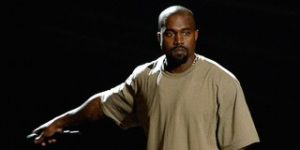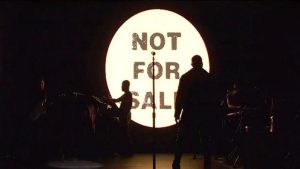
Kanye West and the Necessity of Originality
When culture is mass-produced, all art is in danger of becoming the same.
The sameness infecting our culture today as a result of mass-production is evident. Movies and books recycle the same plots, and musicians recycle the same chord progressions and sounds. This is the effect the domination of the culture industry has had on our society. However, although it may be troubling, we can relax somewhat in the knowledge that our art and culture are not in danger of becoming totally the same—to say so would be to ignore human nature and perhaps the essence of art itself. When we take as a case study the artist Kanye West, we see that while the culture industry uses mass-production to replicate and create sameness, it also needs originality and change to survive.
When we look at great artists in history, it would seem that art is something so individually creative that it is hard to see how a change in the conditions of production could affect that. Beethoven’s compositions and Picasso’s artistic style are creative expressions derived from their utterly unique skillset and perspective. Of course, there have always been artists with similar skillsets who lack the unique creativity of the greats, who resort to replicating and imitating the work of others. The dawn of mass-production and industrialized culture has popularized these artists more than ever in the name of profit. However, while they often reach great heights of popularity, these types of artists are rarely remembered in history. The most famous painters and composers are those who were not only good at what they did, but those who brought their own creative intuition and individual style. The same holds mostly true even in the recent era of mass-produced culture. Bands that had unique sounds, techniques and artistic expressions like Pink Floyd and Led Zeppelin are usually better remembered and more highly regarded than those that reproduced and imitated popular music. Thus, it would seem that while it is possible and very common to create art that is imitational and familiar, the most beloved art tends to be groundbreaking and original.
A perfect modern example of this idea is the Chicago-raised producer, rapper, and cultural icon Kanye West. West has produced six albums (plus one collaboration) to date, all achieving massive commercial and critical success. The most notable aspect of West’s discography is how different each of his albums is not only from one another but also from all music coming out at the time. Each of his projects is a creative endeavor born out of his emotions and beliefs, and all of them deviate remarkably from the rest of the mainstream. This in itself is not so notable—what is important is how successful Kanye West has been while doin g this. Whenever he creates something new, the world listens—and the music industry, or at least the hip-hop genre, is usually sent in a new direction.
g this. Whenever he creates something new, the world listens—and the music industry, or at least the hip-hop genre, is usually sent in a new direction.
This pioneering originality shows itself both on the technical side and lyrical side.
First, let’s examine the technical side, his production work. With his first two albums, College Dropout (2004) and Late Registration (2005), West showed the world what could be done with the technique of sampling. Sampling is when a producer takes short clips of other preexisting music and uses it in creating their own. People had been doing this for years, but West revealed the artistry in it—how one could take these clips and edit them and mix them to form something totally new, and have them stand as the main melody or refrain present in a song. Not only is he very good at this, no one else had been doing anything like it until he started. In his next album, Graduation (2007), while he continued to use his signature sampling, he explored other new sounds that went on to have a lasting effect on hip-hop. This is best shown on the song Stronger. Where before he mostly sampled older soul singers, here he samples a song by the electronic dance group Daft Punk to create a very unique, futuristic sounding track that plays throughout the whole song. The sound was previously irrelevant to hip-hop, but it ended up climbing to #1 on the charts, helping inspire an increased popularity in electronic music. A year later, West released the melancholic, auto tune laden 808s and Heartbreak. While the pitch correcting technology known as auto tune was rising in popularity at the time, many people saw it as a passing, even insidious fad. West showed people that it could be used in diverse ways to genuine artistic merit. All of this goes to show the extent to which individual creativity has an effect on the techniques popularized in the music industry. All musical techniques that sound repetitive and dull now were at one point a new creative breakthrough made by an individual.
For all his technological creativity, West gives just as much attention to his lyrics. In all of his work he goes to great pains to express the emotions and thoughts he has, often laying out important societal critiques in the process. With College Dropout, West summarized the angst of young adults figuring out what to do with their lives. It was an album for and about the struggles of the common man, and it was successful. This had the effect of breaking down the doors of hip-hop, so to say; in the past, rappers had to have some kind of street cred to be allowed in the game. West’s achievements have made space for dozens of other rappers gracing the top charts today (the likes of Kendrick Lamar, Chance the Rapper, Drake, J. Cole and many others have all named him as a major influence). West has continued to express his personal pain mixed with anger at society in all of his ensuing works. In the song Roses, about his grandmother’s passing, he raps the lines: “if Magic Johnson got a cure for AIDS / And all the broke muthafuckers passed away / You tellin’ me if my grandma was in the NBA / Right now she’d be okay?” In New Slaves, on his 2013 release Yeezus, he raps lines like “Fuck you and your corporation / I know that we the new slaves.” These lines highlight his anger at the state of inequality, consumerism and racism today. There are plenty of “political” rappers out there—politics and anti-racism are a large part of the roots of hip-hop music. But for Kanye to integrate those sentiments into his deeply personal lyrics, and somehow wrap that in groundbreaking production with mainstream appeal was revolutionary.
today. There are plenty of “political” rappers out there—politics and anti-racism are a large part of the roots of hip-hop music. But for Kanye to integrate those sentiments into his deeply personal lyrics, and somehow wrap that in groundbreaking production with mainstream appeal was revolutionary.
West doesn’t just express himself through his music; in a time when most public figures are carefully controlled by PR people creating an image, West has never held back from speaking his mind and bearing his soul to the public. He is known for going on long, angry tirades to crowds, expressing his anger at what he thinks has gone wrong in society and the music industry. To give an example, during one of these tirades last year he said: “Radio, fuck you! Not fuck the people that work the radio, they just real people that gotta feed they kids. And they not being allowed to play that real shit. And they think that to feed they kids they gotta play the same shit over and over and over.” This shows his direct opposition to the sameness being propagated in the music industry. He does his best to stand independent of the industry and instead be a guiding moral force. His brash views are always provocative and inciting, but at least he is not complicit in the mass-produced sameness. At most he is an inspiring innovator, pushing the boundaries not just of hip-hop and music but also of our culture and society.
Kanye West’s success is a good demonstration of the fact that the new and original fundamentally has a place in the culture industry. It is artists like West, those who look ahead of what is popular in the moment, who drive the industry. If all the industry needed was to be able to mass-produce art, kids would still be listening to rock and roll. Instead, it is constantly shifting, being pushed by the shifting originality of artists. This constant change is always needed to satisfy the populace. It may be true that the culture industry now has the power to stay in control by capitalizing on and adopting this change—many great, original artists are roped into the mainstream by money—but it is still responding to the originality of artists. The nature of art includes a reliance on the shifting originality of artists, and the nature of consumers includes a constant desire for new stimuli—therefore mass-production can never fully eliminate the differences in art. Now the interesting question becomes, who will be the next Kanye, and what will popular music sound like 5, 10, 25 years from now?